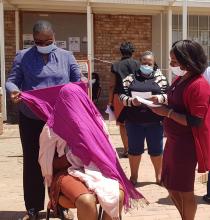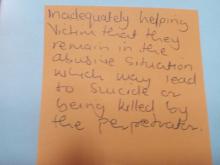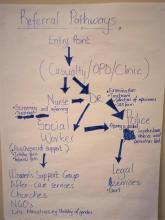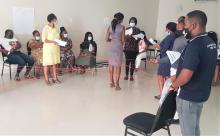Namibia's Health Sector responding to violence against women and girls
Violence against women and girls is a violation of their human rights and is largely hidden, stigmatized, and unrecognized by health and other service providers. Despite the robust policy and legal framework in Namibia, women and girls are still exposed to violence throughout their lifecycle whether at home, schools or the communities they live in. Globally and in Namibia one in three women experience physical and/ or sexual violence; majority perpetrated by intimate partners. Six percent of Namibian women reported experiencing violence during pregnancy and fifteen percent who experienced violence never sought help or told anyone about the violence.
The impact of violence on women is significant and can have long-lasting effects on their physical and mental health, including injuries, unintended pregnancy, adverse birth outcomes, abortions, HIV and sexually transmitted infections, depression and alcohol-use disorders. Most survivors of gender-based violence are more likely to seek health care than non-abused women, even if they don’t disclose the violence to the health care provider. Health care providers are therefore in a unique position to support women who have experienced violence.
In recognition of this opportunity by the health system to identify and intervene early, the Ministry of Health and Social Services with support from WHO, UNFPA, I-Tech and other partners adapted the Clinical handbook for the health care of women subjected to intimate partner violence and/or sexual violence. The handbook serves as a catalyst for strengthening the health sector response to gender-based violence and to enable a review for the provision of a comprehensive and quality care at facility level. It allows for policy reform that is more responsive to the health care needs of women and girls subjected to intimate partner violence. The implementation of the handbook is also opening dialogues on documenting cases to improve health care, track prevalence and ensure safety of survivors.
Since the launch of the clinical handbook in April 2019, MoHSS oriented health managers from all 14 regions of different levels on the provision of the handbook to ensure support towards its implementation and availing resources to address some of the gaps in service provision. MoHSS established a multisectoral Core Team and through this team finalized the training manual for training trainers on the handbook. To date 207 health care workers from Khomas, Karas, Hardap, Erongo, Otjozondjupa, Omaheke and Kavango East and West Regions have been trained with the aim to strengthen the capacity of programme managers, staff and service providers with skills, knowledge and attitudes required to support the delivery of timely and quality services to intimate partner violence and sexual violence survivors. With these trainings, women and girls who are subjected to intimate partner violence may find protection and care and be introduced to other services to ensure their safety and interventions against the violence at home.
The training specifically aimed to:
- Strengthen knowledge on evidence-based clinical practices for management of sexual violence and intimate partner violence
- Strengthen skills on how to a) identify survivors of intimate partner violence; b) provide psychosocial and mental health support to all survivors; and c) take history, conduct examination and offer treatment to sexual assault survivors
- Reflect on attitudes and on systemic barriers that prevent provision of quality care to survivors of intimate partner violence or sexual violence
WHO will continue its support to the MoHSS to build the capacity of health care workers, develop policies and mobilize resources to enable the health sector comprehensive response to survivors of intimate partner violence and/or sexual violence.







